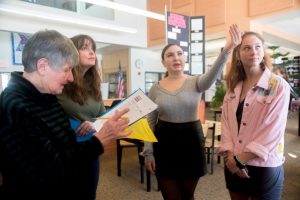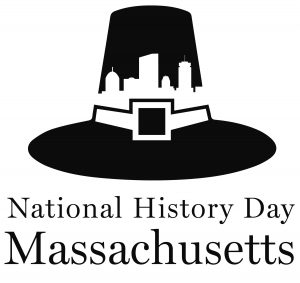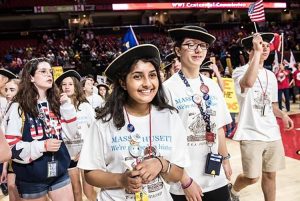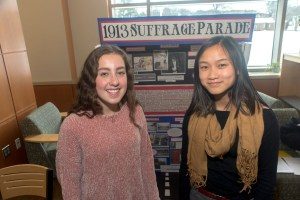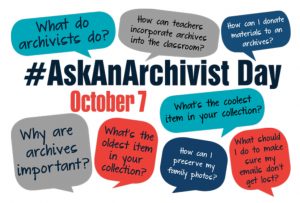by Rakashi Chand, Senior Library Assistant
Though the MHS remains closed to the public due to the ongoing COVID-19 epidemic (learn more), our library staff has been able to provide various reference services. Below, several Reader Services staff members offer insight into what it is like to work–both in the building and remotely–during the pandemic.
How has the MHS adjusted and continued to serve its researchers?
Elaine Heavey, Director of the Library, and Dan Hinchen, one of our Reference Librarians, describe how operations in the Library Reader Services department were amended to accommodate the restrictions posed by COVID-19:
In the aftermath of the state-wide shutdown in mid-March, the library reader services (LRS) staff had to develop new ways to serve our researchers. Of course, as a manuscript repository holding one-of-a-kind materials, serving researchers without direct access to our collections proved difficult. Still, the LRS staffers worked from their various remote locations to provide as much access as possible to those we serve.
In the early stages of the pandemic, we tackled a project to locate digital versions of every title in the Dowse Library and compiled the links so that we could easily share them with researchers. The LRS staff also created a Reference Services During Covid-19 Closure page, providing links to various print publications in digital format, MHS online resources and collection highlights, and a list of commercial databases that feature MHS content ,all in one place.
In addition to concerns about collection access, communication became more challenging. Although e-mail remains our primary method of contact with remote researchers, we found we had lost the ability to work with remote researchers in the moment via telephone. To meet that challenge we sought new means of communicating with researchers. Through our Virtual Reference and Chat Services page researchers can ask questions instantly via chat (Mon., Wed., Thurs., Fri. 10AM to 4PM; Tues.1PM to 7PM), or request a research consultation with a member of the library staff via Zoom. Now, anyone interested in speaking an LRS staff member “face-to-face” has that option.
In July, when our library staff regained access to the building, we began tackling the sizable backlog of reproduction and reference requests that accumulated over the four months we were away from 1154 Boylston. Of course, in keeping with the trends of life this year, staff use of collection material became more complicated when we found ourselves navigating the creation of new collections handling polices aimed at mitigating the health risks of working with shared materials. Determining best practices around issue like quarantine times, thinking about how to safely quarantine materials, and adjusting our workflows to allow for quarantine between uses, proved to be a moving target as new information about Covid-19 transmission and the time Covid-19 lives on library materials (especially those that cannot be sanitized) became available. We recently extended our quarantine times based on new industry findings, but we will not let that slow us down.
Despite the difficulties the shutdown threw at us, our library staff has worked hard adapting to the situation and strives to continue providing our researchers the best possible remote service until we are able to welcome them back into the library again.
How has the COVID19 state of emergency impacted your work as an archivist and how did you overcome the challenges presented?
Anna Clutterbuck-Cook, one of our Reference Librarians, not only found ways to overcome the restrictions imposed by remote work and COVID19, but also found ways to assist fellow archivist during this difficult time:
As a reference librarian who works in a special collections library, moving first to an all-remote work environment in March and now a partially-remote, partially-on site (but still with no patrons in the building) work environment this fall really impressed upon me how much of my job is having conversations with people. All day long, I engage in conversations with my colleagues and with researchers about the work we are doing together or the work they hope to undertake using our collections. And those conversations can take place, and be fruitful, whether I am at the reference desk or at my dining room table.
I have also been acutely aware of the way that COVID-19 has impacted archival workers unevenly. Those already precariously employed in our field (part-time, contract, student, grant-funded, etc.) have often been the first to see their hours cut or their positions eliminated. During March, a group of archival workers – including myself — came together to establish the Archival Workers Emergency Fund, currently administered by the Society of American Archivists Foundation, which issues cash grants to archival workers in financial crisis due to COVID-19. As of September 15th we have disbursed over $130,000 to over 150 archival workers who are struggling to pay the bills. This has been a major part of my involvement with the wider archival community since March, and gave me something concrete to do to address the suffering that people across the country are experiencing because of the pandemic.
Hannah Elder, our Reproductions Coordinator, saw her role expand as reproductions became the sole source of collection access for undigitized collections:
While working from home, I managed the incoming reproduction requests; contacting the researchers, keeping track of their requests, and helping them find already digitized materials when available. I also worked with my colleagues to develop temporary reference reproduction policies and pricing that enables us to provide our researchers with the resources they need. Find those new policies here! (http://masshist.org/library/reproductions/photocopies)
Now that the staff have some access to the building, I spend my time at 1154 Boylston Street in a flurry of activity, scanning items, photographing volumes, and going through microfilm. I spend my time at home processing the images the reproductions team and I made in the building and sending them off to researchers, while also managing incoming requests, staffing the chat services, and planning for my next rotation through the building.
We will continue to share stories with you throughout Archives month and look forward to answering your questions through our virtual reference and chat services.
Until the next installment, be well!



